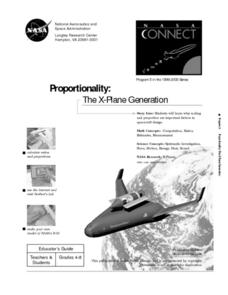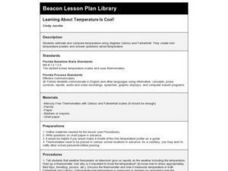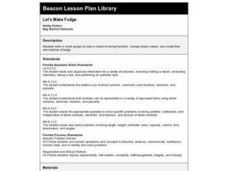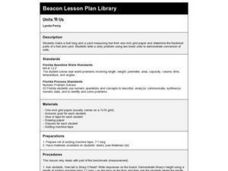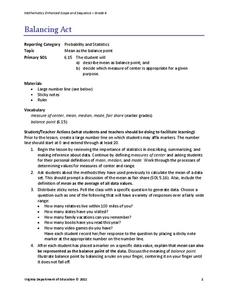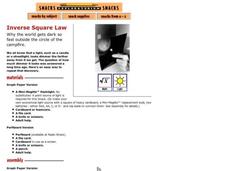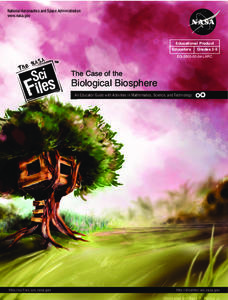Curated OER
Proportionality: The X-Plane Generation
Students meet NASA researchers who describe the relationship between force, energy and motion. They discuss how NASA's experimental X-plane is being tested to make space travel more reliable and show how proportionality and ratios are...
Curated OER
Learning About Temperature Is Cool!
Students estimate and compare temperature using degrees Celsius and Fahrenheit, and create mini temperature posters and answer questions about temperature.
Curated OER
Learning Lesson: Heavy Air
Students complete an experiment in which they discover air has weight. They use the same size balloons to explain this concept. They also examine thunderstorm safety.
Curated OER
Let's Make Fudge
Students make fudge after reading fractional values in recipes and finding equivalent fractions to those presented in the recipes. They study measurement abbreviations.
Curated OER
Search for the Missing Pi
Third graders work in groups of two to three with measuring tapes, finding the circumference and diameter of teacher-selected circular items. They relate circumference and diameter measurements to find pi.
Curated OER
Reaction Time
Third graders review important vocabulary to explain measures of central tendency and reaction time. In pairs, they measure reaction time of dropping and catching a ruler. Data is collected after repeated catches and information is...
Curated OER
Where in Our Solar System Are We?
Second graders research distance between planets and the sun using encyclopedias. They use toilet paper sheets as a unit of measurement (50 million km.) students stand at planet locations using toilet paper to measure distance between.
Curated OER
UFOs
Students, in groups, construct a catapult. Then they conduct a series of experiments by catapulting a marshmallow, using different lengths of spoons, across the room. They predict, measure, and record the measured distance on a worksheet.
Curated OER
Fahrenheit Follies
Second graders analyze the effects of sunlight on a glass of water by using the thermometer to measure its temperature. They predict and measure the difference between water outside in the sun and shade and inside. They role-play a game...
Curated OER
Breezy Energy
Third graders view photos of machines that measure wind energy and chart what they observe in the pictures and the questions they have about the pictures. In this wind energy lesson, 3rd graders make a pinwheel. Students show...
Curated OER
It's About Time!
Students read a short tutorial and complete one or more online activities. They visit an online math dictionary to learn the value of a day, month, week, and year. In addition, they construct word problems based on a favorite month;...
Curated OER
What's Your Angle?
Third graders read the story, Magic Schoolbus Inside the Human Body. Then they form right, acute, and obtuse angles using the joints inside their bodies. They write a brief summary about what they learned about angles as a review the...
Curated OER
Projectile Motion
Students observe projectile motion and calculate the speed of a baseball based on the time and distance traveled. They record the time, measure the distance, and draw the path of the ball's travel on a data table.
Curated OER
Units 'R Us
Second graders, using one inch grid paper, create a foot long and a yard measuring tool.
Curated OER
Measuring Distance and Area in Satellite Images (College Level)
Students are able to download, install, and use Image J image analysis software to quantify change over time in satellite images. They access and download satellite images for specific locations and times. Students set a scale (spatial...
Curated OER
The Circle's Measure
Young scholars explore circumference and diameter. In this math lesson, students apply their knowledge of circumference and diameter to solve mathematical riddles. Young scholars apply this knowledge to find circumference and diameter of...
Curated OER
What Can You Learn From A Mealworm?
High schoolers collect data from mealworms. In this science and math lesson plan, students gain an understanding of collecting metric data using mealworms.
Virginia Department of Education
Balancing Act
How many different interpretations of the mean are there? Scholars place numbers on a number line and determine the mean. They interpret the mean as the average value and as the balance point.
Exploratorium
Inverse Square Law
The inverse square law is revealed when your class participates in this activity. They move a graph paper or perfboard square back and forth in a square of light to see how the intensity changes. You will definitely want to add this...
Curated OER
The Stained Glass Window
Learners use centimeter rulers and the attached worksheet containing a scale drawing of a stained glass window. The actual measurements of the stained glass window are given, and students are asked to find the actual measurement of the...
Curated OER
TE Activity: The Beat Goes On
Students determine what the pulse is before examining how to measure the heart rate in different situations. They build a simple device that measures the heart rate, take heart rates, and record them on a worksheet. They discuss how...
Curated OER
Sea and Ice Salinity
Students conduct an experiment. In this salinity lesson, students learn about sea ice, why it is important and how changing amounts can affect the sea. Students conduct an experiment to find out the effects of salinity on the...
Curated OER
The Case of the Biological Biosphere: Health, Math, Technology
Learners investigate various aspects of the human body in this imaginative Tree House Detective episode about the biological biosphere. In a series of They take measurements, analyze data, and use technology. The lessons...
Alabama Learning Exchange
The Moon's Craters
Fifth graders investigate the formation and size of impact craters. In small groups, they conduct an experiment that involves dropping marbles into flour and measuring the impact from various heights and discussing their hypothesis and...
